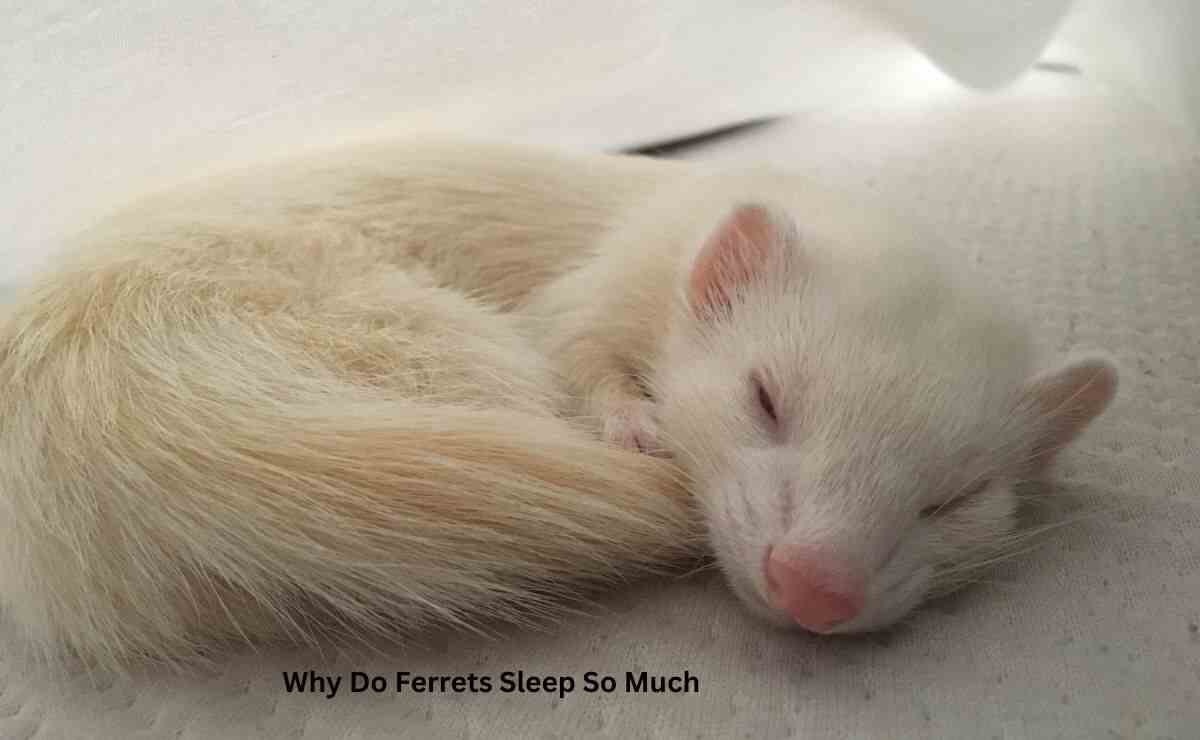Ferrets are adorable, curious creatures that have become popular pets in recent years. Despite their playful nature, ferrets are known to sleep a lot, often up to 18 hours a day. This may leave many pet owners wondering why do ferrets sleep so much?
In this article, we will explore the reasons behind ferrets’ sleeping habits and shed light on what you can do to ensure your ferret gets the proper amount of rest they need for optimal health and well-being. So if you’re a proud owner of a sleeping ferret or considering adopting one as your next pet, read on to learn more about this fascinating aspect of their behavior.
Why Do Ferrets Sleep So Much?

Ferrets are obligate carnivores, meaning they must eat meat to survive. This diet requires a lot of energy and ferrets need to sleep in order to conserve it. In fact, ferrets can sleep up to 18 hours a day!
Ferrets are generally very active, but still, they sleep a lot. This is because ferrets are crepuscular, meaning they are most active at dawn and dusk. During the day, when it’s light out, they tend to sleep more in order to conserve energy for their nighttime activities.
Ferrets also have a unique physiology that allows them to sleep deeply for long periods of time. They enter a state known as “torpor” which is similar to hibernation in other animals. In this state, their body temperature drops and their metabolism slows down significantly. This helps them conserve energy while they sleep.
Besides these natural tendencies, ferrets may also be sleeping more due to depression, boredom or lack of stimulation. If your ferret is not getting enough exercise or mental stimulation during the day, it may be sleeping more than usual as a way of coping with its environment.
Ferrets also have very small stomachs, so they need to take multiple naps throughout the day in order to digest their food properly. This is why you may see your ferret sleeping after meals.
How Many Hours Does A Ferret Sleep?
Ferrets are known for their active and playful personalities, but they also need plenty of rest. On average, ferrets sleep between 14-18 hours a day. This is broken down into several naps throughout the day, with some periods of wakefulness in between. Ferrets tend to be most active at dusk and dawn, so these are the ideal times for playtime.
In addition to their regular sleeping schedule, ferrets can also enter a type of hibernation known as “sleep-stunting” during winter months. This is when their body temperature drops and they become less active than usual and remain dead sleep. During this time, ferrets may sleep up to 20 hours a day in order to conserve energy.
It’s important to provide your ferret with a comfortable environment that allows them to get the rest they need. Make sure their cage is away from any loud noises or bright lights that could disturb them during sleep time.
Do Baby Ferrets Sleep Much Than The Grown Ups?
Yes, baby ferrets do sleep more than their adult counterparts. Baby ferrets typically sleep 18-20 hours per day, while adults only need 10-12 hours of rest. This is because baby ferrets are growing rapidly and need the extra rest to fuel their development.
Baby ferrets also tend to sleep in shorter bursts than adults, waking up often throughout the day. This helps them stay alert and active when they are awake so they can explore and learn about their environment.
It’s important to note that young ferrets can be quite active when they are awake, even during the night. If you’re a light sleeper, it might be best to keep your baby ferret in a different room!
When Do Ferrets Sleep Much?
Generally, ferrets will sleep for around 18-20 hours a day, usually in small bursts of 2-4 hours at a time. They tend to be most active during the early morning and late evening, with more restful periods occurring during the afternoon and night.
When it comes to their sleeping habits, ferrets are considered “crepuscular” animals, meaning they are most active during the twilight hours. This is why it’s important to provide them with plenty of stimulation when they’re awake so that they don’t become bored or restless.
Providing them with safe toys and activities can help keep them entertained while also allowing them to get the rest they need.
Overall, ferrets tend to sleep for long stretches of time but may wake up periodically throughout the day.
Conclusion
Ferrets sleep so much because they are crepuscular animals who are naturally active during dawn and dusk. Ferrets have a fast metabolism that requires them to rest for extended periods to conserve energy.
They also need plenty of sleep to promote physical growth, strengthen their immune system, and enhance their cognitive abilities.
Moreover, the quality of their sleep cycle is crucial for maintaining their optimal health and vitality. Therefore, it’s essential to provide your pet ferret with a comfortable sleeping space or cage and ensure they get adequate rest time.
By understanding the sleeping habits of ferrets, you can better care for your furry companion and help them thrive in their domestic habitat.
